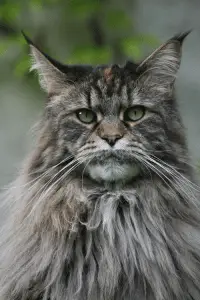The average lifespan of a Maine Coon cat is about 10 to 13 years, which is a bit on the shorter side compared to most cat breeds. Don’t fret, though, as there are a lot of things you can do to help your Maine Coon reach their full life expectancy, which may well be beyond the average.
Genetic Factors in Maine Coon Life Expectancy
There are a lot of factors that play into your Maine Coon’s lifespan, some of which you do and do not have control over. Many Maine Coon owners attest that size seems to have an affect on lifespan, with smaller Maine Coons living a bit longer. Females also tend to have a higher average lifespan, but that might be because females are also at a lower risk of certain heritable diseases.
Obviously the lifespan of the Maine Coon’s parents will have a large effect on their own, but that can also be interrelated with size and risk of genetic disorders.
Lifestyle Factors in Maine Coon Life Expectancy

Although any cat’s life expectancy will be largely affected by genes, there are a lot of things you can do to help ensure they life up to the maximum number of years their genetic code will allow, which is oftentimes higher than many people realize.
There are reports of many Maine Coons living beyond 15 years of age, and lifestyle probably has a huge hand in that.
Feed Your Maine Coon a Healthy Diet
Perhaps the most important thing you can do for your Maine Coon is feed them a healthy diet. Cats can develop diseases from an unhealthy diet, including diabetes, kidney problems, liver problems and just general degeneration.
Of course, what composes a healthy diet is always up for debate. Should you feed them primarily a raw food or canned food diet? How much dry food do you use to supplement the wet food? All these questions will depend on your Maine Coon and their specific health status.
One thing that is for sure, though, is that dry food almost always has a negative effect on a cat’s health. Dry food is full of chemical fillers and carbohydrates, both of which can contribute to obesity and general poor health. Dry food also lacks the water cats need to stay hydrated. Cats in the wild get about 75% of their hydration from their food; they’re simply not wired to try to drink all of that from a water source. Dry food can contribute to dehydration and ultimately kidney damage.
Overfeeding is also common, and detecting obesity in Maine Coons can sometimes be difficult because of their thick coat and naturally big stature. Your vet can help you determine the right weight for your Maine Coon and conduct a physical examination to determine if they’re carrying too much heft.
Exercise Your Maine Coon
Diet and exercise go hand in hand; you can’t really have one without the other. Both can prevent obesity and ensure optimal physical and psychological health in your Maine Coon.
Make sure to provide a large enough area that your Maine Coon can run around in and plenty of toys to play with. It’s also not enough to just leave them alone all day, you have to interact!
Keep Your Maine Coon Indoors
Another effective thing you can do to help your Maine Coon live longer is keep them indoors. You might be tempted to let them roam around the yard or neighborhood from your feelings of nostalgia when the Maine Coon used to roam the forests of Maine, but letting your cat outside often has some major health consequences.
The average life expectancy of purely outdoor cats is only about 2-5 years, and while your Maine Coon would never be a purely outdoor cat it shows how significant of an impact it can have.
Just a few things you should be wary of when letting your Maine Coon outside are:
- Poisons
- Viruses and Bacteria
- Predators (coyotes, dogs, bigger cats)
- Getting trapped
- Being stolen
- Cars and other vehicles
If you insist on having your Maine Coon go outside from time to time, it’s a good idea to keep them on a leash and always keep an eye on them. An enclosed porch can have the same effect but keep your Maine Coon safe from the list of dangers above.
Brush Your Maine Coon
It might seem insignificant, but brushing your Maine Coon can have positive effects on their overall health and life expectancy. You can reduce the number of hairballs be grooming your Maine Coon at least once every two weeks.
Reduce Stress
Creating a stress-free environment for your Maine Coon can keep them from developing physical and behavioral issues associated with stress. It can be difficult to determine what exactly causes stress in cats because they’re stressed out by different things than we are and oftentimes don’t show their distress.
Just providing at least one safe place in the house you Maine Coon can go where they will not be handled (picked up, played with, etc) will help a lot. Anytime they’re being agitated by another pet or person or spooked by a vacuum cleaner or loud noice they can retreat to their safe place.
Don’t Smoke Around Your Maine Coon
Secondhand smoke can affect cats as much as it can humans. Cats are twice as likely to die of cancer if their owner smokes. Although it’s unlikely that you or a member of the household will quit altogether, there are a few actions you can take to reduce your Maine Coon’s exposure.
Step outside to smoke whenever possible or open a window. You might also consider only smoking in a particular room that you keep your Maine Coon away from when you’re smoking.














